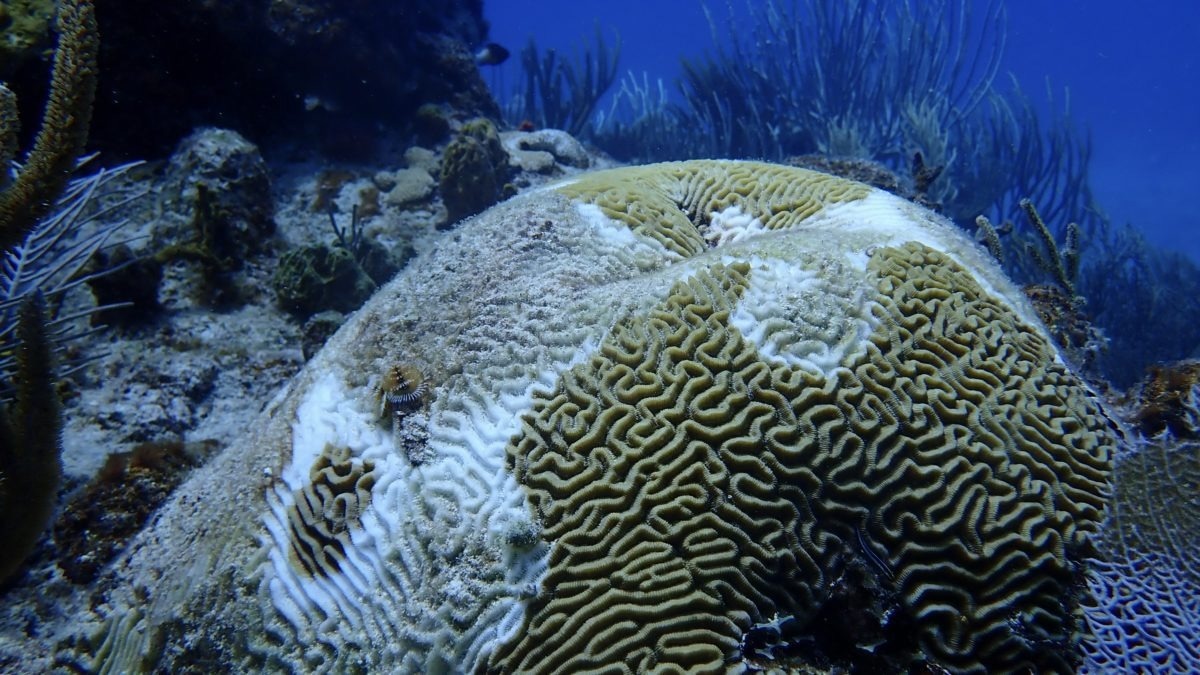The human gut harbors various microbes, some of which can cause illness, while others play crucial roles in maintaining gut health. However, humans are not the sole beneficiaries of these microorganisms. Coral reef ecosystems also depend on them to efficiently recycle organic matter and nutrients.
 A coral plagued with stony coral tissue loss disease on St. John, USVI coral reefs. This coral disease event started in 2020 on St. John reefs. WHOI researchers identified microbial community and nutrient changes in the overlying seawater associated with this major disturbance event. Image Credit: Cynthia Becker, ©Woods Hole Oceanographic Institution
A coral plagued with stony coral tissue loss disease on St. John, USVI coral reefs. This coral disease event started in 2020 on St. John reefs. WHOI researchers identified microbial community and nutrient changes in the overlying seawater associated with this major disturbance event. Image Credit: Cynthia Becker, ©Woods Hole Oceanographic Institution
Microbes support the nutrition of corals and other reef-dependent organisms. Over seven years, during which there were periods of storm and coral disease disturbance, researchers from WHOI examined eight reefs in the US Virgin Islands to study the microbes in the water of the reefs.
Coral reefs have been declining for decades. Climate change, hurricanes, disease, and other stressors have played a major part in that, Reefs provide habitat for about 25% of all marine species, but they also support billions in tourism and fishing. It is important for us to monitor changes in coral reefs as they are happening and the microbes in their environment can really help us do that.
Cynthia Becker, Study First Author, Woods Hole Oceanographic Institution
The study, which was published in the journal Environmental Microbiology, explains the effects of coral reef disturbances on microbes.
During the two major events studied—hurricanes Irma and Maria in 2017 and the stony coral tissue loss disease outbreak that began in 2020—ammonium concentration in the water rose, resulting in a 34% reduction in Prochlorococcus bacteria. Prochlorococcus, a tiny photosynthetic bacterium, introduces new carbon into the coral ecosystem, promoting its well-being and generating oxygen for our atmosphere.
A lot of how we study coral reefs is done on a macroorganismal level. However, alterations in corals and fish communities might remain unseen for months or years. This makes it difficult to track the health of these vulnerable reefs in real time.
Amy Apprill, Study Corresponding Author and Microbial Ecologist, Woods Hole Oceanographic Institution
Amy Apprill adds, “Microbes are the hidden engines of coral reefs, and they grow quickly and are responsive to nutrient, temperature, pH, and other conditions. By sampling the water, we can see the immediate impacts of disturbances and intervene to support the reefs before the situation potentially worsens.”
Researchers examined the microbial ecology of the reef using eDNA. Using this genomic technique, microorganisms were identified by sequencing the microbial DNA found in samples of reef water, which contains approximately one million microbial cells per ml. This gives scientists a non-intrusive technique to collect data on the state of the reef in almost real-time.
Understanding the composition of a healthy reef microbial community is important. Without the balance of micro and macroorganismal health, you cannot have a healthy functioning ecosystem, another benefit to this advancement is for coral reef restoration efforts. The microorganisms can provide an assessment of the ecosystem health. This could complement visual assessments to determine if a reef’s health has been restored.
Cynthia Becker, Study First Author, Woods Hole Oceanographic Institution
The study was funded by The Tiffany Foundation, NOAA, WHOI Ocean Ventures Fund, the National Science Foundation, and WHOI’s Reef Solutions Initiative.
Journal Reference:
Becker, C., et al. (2024). Microorganisms uniquely capture and predict stony coral tissue loss disease and hurricane disturbance impacts on US Virgin Island reefs. Environmental Microbiology. doi.org/10.1111/1462-2920.16610.